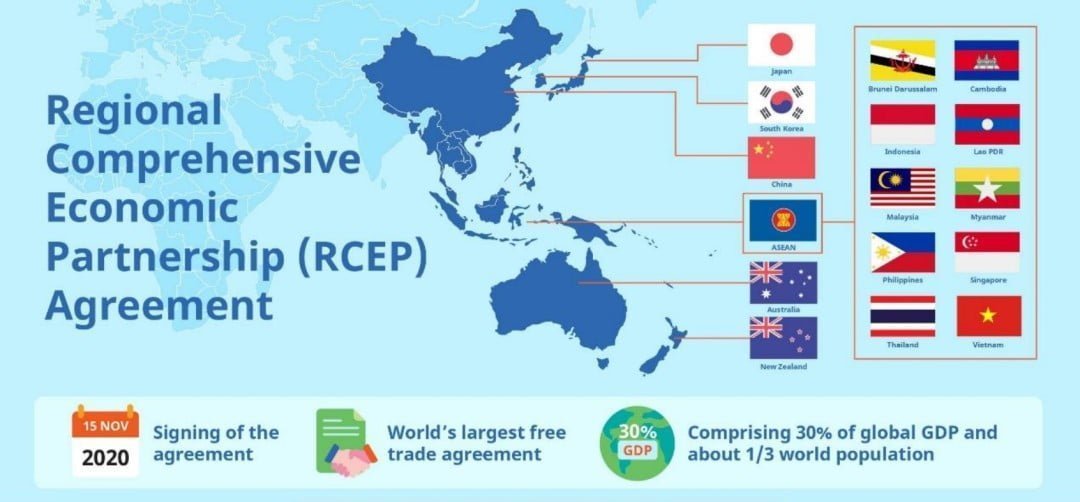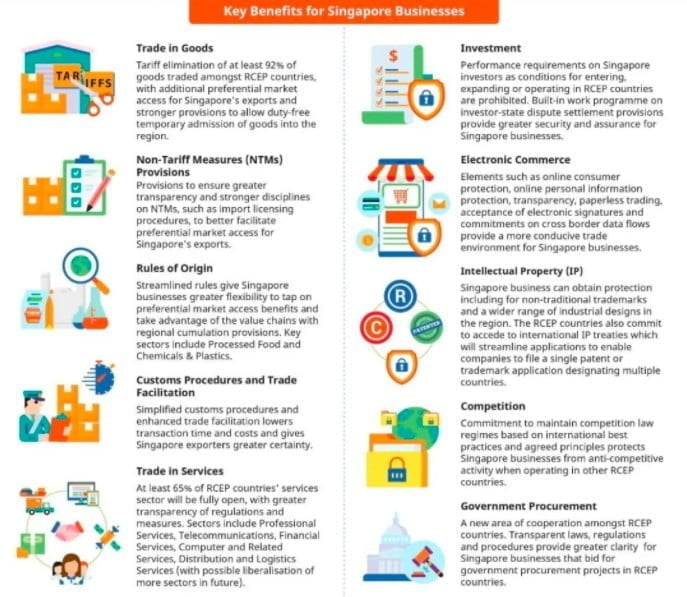Why NUS | RCEP Boosts Demand for Talents in Asia
Why NUS | RCEP Boosts Demand for Talents in Asia

▲Source: Official website of the Ministry of Trade and Industry, Singapore
On 15 November 2020, Singapore and 14 countries, including China, officially signed the Regional Comprehensive Economic Partnership (RCEP) agreement, the world’s largest free trade agreement (FTA) to date.
Chan Chun Sing, Minister for Trade and Industry from Singapore, pointed out that the RCEP is a key regional agreement that will promote greater economic integration in the region.
Chinese Premier Li Keqiang said that the free trade bloc has the largest participating population in the world, the most diverse membership and the greatest development potential. The signing of the RCEP is not only a landmark achievement of East Asian regional cooperation, but also a victory of multilateralism and free trade.
In the shadow of the novel coronavirus (COVID-19) pandemic, a stronger Asia capable of driving global economic growth is opening up more opportunities and boosting demand for new talent.

▲Source: Official website of the Ministry of Trade and Industry, Singapore
The RCEP is made up of the 10 ASEAN Member States (Brunei Darussalam, Cambodia, Indonesia, Lao PDR, Malaysia, Myanmar, the Philippines, Singapore, Thailand and Vietnam), China, the Republic of Korea, Japan, Australia and New Zealand. It is the world’s largest FTA, comprising about 30% of global Gross Domestic Product (GDP), or S$35 trillion, and about a third of the world’s population.
With the signing of the RCEP, there are ten key benefits for regional businesses:
The mutual benefits, value and opportunities created among the RPCs also call for regional talent in Asia that can play an important role in economic and cultural interactions.

Speaking on the University’s “roots”, Professor Tan Eng Chye, President of NUS, quoted the remarks of Sir John Anderson, Governor of the Straits Settlements in 1905, at the opening ceremony of the Straits Settlements and Federated Malay States Government Medical School (the predecessor of NUS) as follows:
“I am sure that you will realise the best hopes of the government and the community. It is to you that the government looks especially. You are of the East, and to you they look, to break down the walls of native prejudice and overcome his ignorance. You have access as the Westerner has not, to the inmost household in the East.”
Thus, throughout its 115 years of history, NUS has consistently ranked among the top universities in Asia, adopting the strengths of both the East and the West but with a clear focus on Asia itself at all times.
With understanding, service and passion, as well as inextricable linkages to Asia, NUS is committed to nurturing talent for the region and is well-equipped for the areas covered by the RCEP.
▲ Vision, mission and values of NUS
In 2018, Prof.Tan Eng Chye spoke at the alumni gathering “A Date with NUS President” in Shanghai, China: “As ASEAN and China continue to grow and develop, we will have more opportunities to build communication networks and be proactive. By addressing the challenges ahead, NUS hopes to be a focal point that connects these dynamic economies, creating a variety of new opportunities for current students and alumni around the world.”
NUS’ connections and collaborations with its Asian partners are deeply based on regional understanding and foresight, working together to nurture talent for all key processes.
In the future, the RCEP will give further play to the role of Asian universities in talent cultivation. The anticipated flows of goods, technology, services and capital with unprecedented effectiveness are set to usher in a vibrant new era of talent mobility across the region.
The Times Higher Education Global University Employability Ranking 2020, a survey involving recruitment companies and employers in various countries, ranked NUS 9th out of 250 universities in 43 countries and regions.
Commenting on this, Prof. Ho Teck Hua, Senior Deputy President and Provost of NUS, said: “With the recent international landscape disrupting the nature of work, NUS is accelerating the pace of nurturing resilient graduates with cross-cutting practical skillsets, knowledge, and life skills, whilst allowing them to develop a growth mind-set to cope with global disruptive transformations.”
In previous media interviews, NUS President Prof. Tan Eng Chye repeatedly elaborated on NUS’s innovative efforts in lifelong education and interdisciplinary education. Facing up to reality and the future, boldly overturning some traditional models that no longer hold water, and offering a university education that is valuable to the development of individuals and society, NUS has sought to lead the way.
In the post-pandemic era, everything will be different, either in the way we live or in the way the economy works. Young people will be confronted with a world of challenging problems that are ill-defined, ever-changing, and requiring multi-disciplinary solutions. They may even need to challenge established bodies of knowledge.
Over the last two years, NUS has launched multiple new graduate programmes, including the MSc in Industry 4.0, MSc in Data Science and Machine Learning, MSc in Venture Creation, Master of Computing – General Track, and Master of Social Sciences (Communication), all of which respond to the challenges and opportunities that have come along in an increasingly Volatile, Uncertain, Complex and Ambiguous (VUCA) world.
At NUS, the talents of the future will find a programme that best suits their interest and helps integrate their personal aspirations into a golden age of Asian development.